Responsibilities of Tutor, Mentor, and Coach for Individual Learners
VerifiedAdded on 2023/06/10
|12
|3540
|416
Report
AI Summary
This report delves into the multifaceted aspects of working with individual learners, encompassing the roles of tutors, mentors, and coaches. It meticulously outlines the responsibilities associated with each role, emphasizing the distinct differences between teachers, coaches, and mentors, and their respective effectiveness in addressing individual learning needs. The report explores various strategies designed to meet diverse learning requirements, including the implementation of new learning domains, and examines the resources essential for effective multi-agency collaboration. It also investigates the factors influencing the referral process and reviews one-to-one coaching to fulfill learners' emotional, intellectual, and social needs. Furthermore, the report presents an action plan for identifying strengths and areas for improvement in teaching practices and analyzes the effectiveness of coaching in one's own practice, culminating in a comprehensive understanding of individualized learning support.
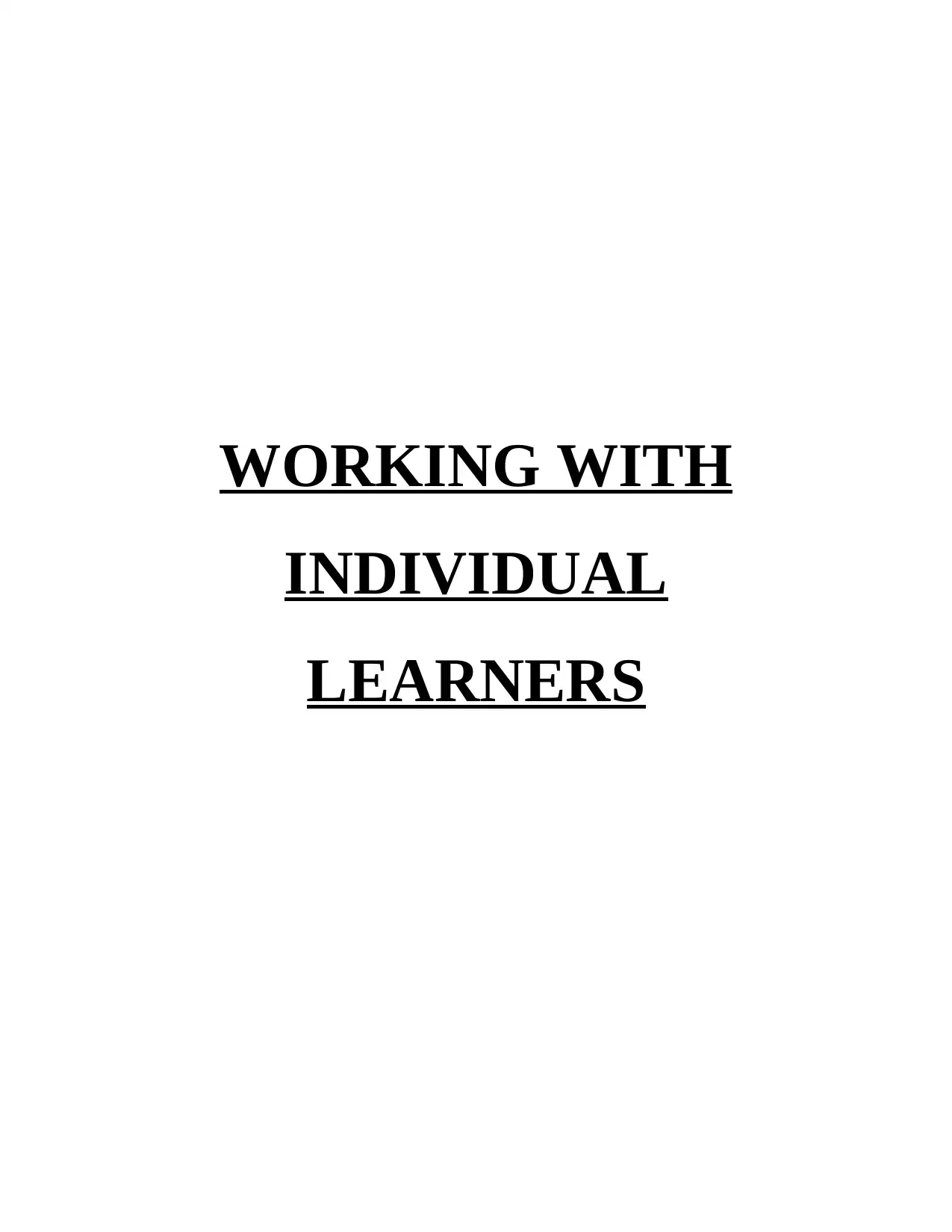
WORKING WITH
INDIVIDUAL
LEARNERS
INDIVIDUAL
LEARNERS
Paraphrase This Document
Need a fresh take? Get an instant paraphrase of this document with our AI Paraphraser
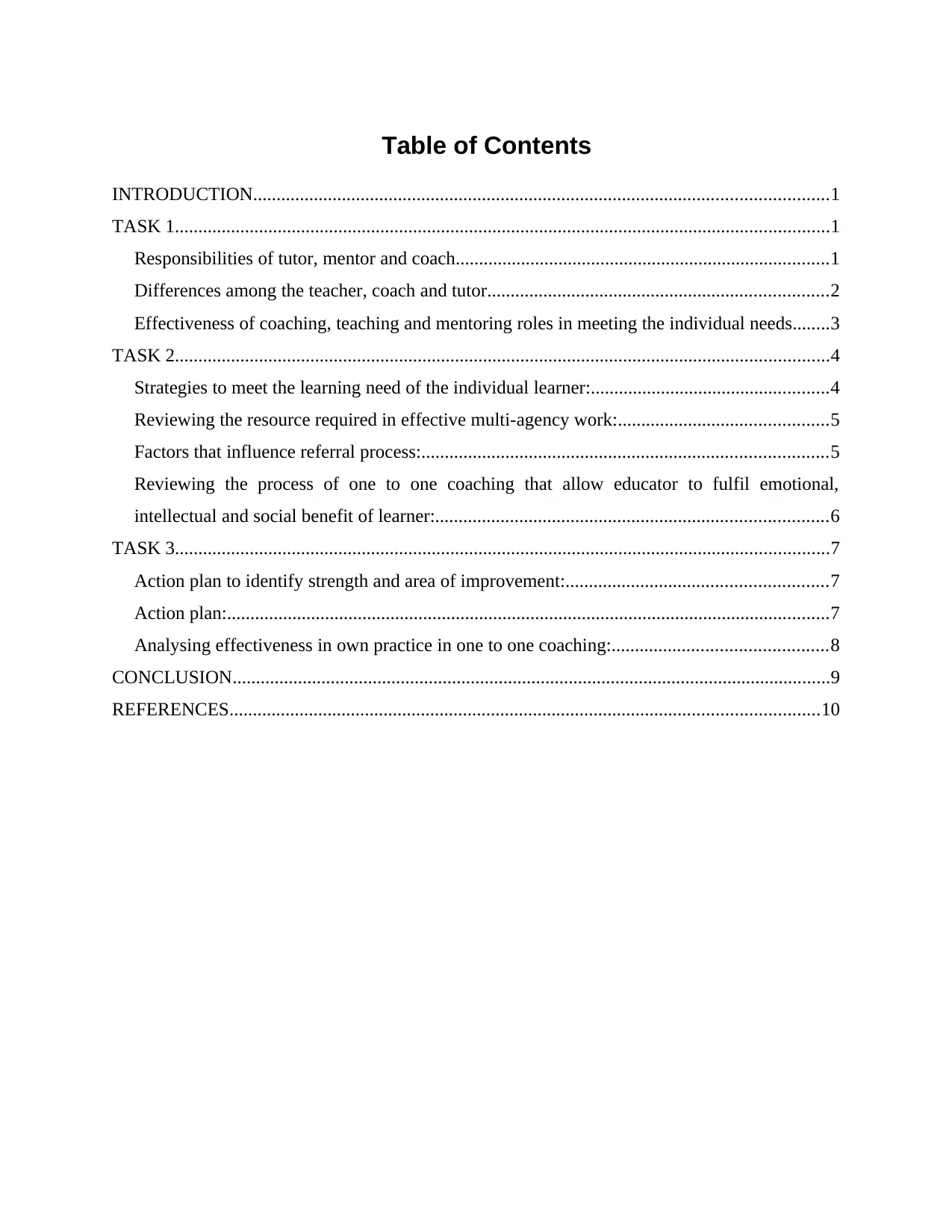
Table of Contents
INTRODUCTION...........................................................................................................................1
TASK 1............................................................................................................................................1
Responsibilities of tutor, mentor and coach................................................................................1
Differences among the teacher, coach and tutor.........................................................................2
Effectiveness of coaching, teaching and mentoring roles in meeting the individual needs........3
TASK 2............................................................................................................................................4
Strategies to meet the learning need of the individual learner:...................................................4
Reviewing the resource required in effective multi-agency work:.............................................5
Factors that influence referral process:.......................................................................................5
Reviewing the process of one to one coaching that allow educator to fulfil emotional,
intellectual and social benefit of learner:....................................................................................6
TASK 3............................................................................................................................................7
Action plan to identify strength and area of improvement:........................................................7
Action plan:.................................................................................................................................7
Analysing effectiveness in own practice in one to one coaching:..............................................8
CONCLUSION................................................................................................................................9
REFERENCES..............................................................................................................................10
INTRODUCTION...........................................................................................................................1
TASK 1............................................................................................................................................1
Responsibilities of tutor, mentor and coach................................................................................1
Differences among the teacher, coach and tutor.........................................................................2
Effectiveness of coaching, teaching and mentoring roles in meeting the individual needs........3
TASK 2............................................................................................................................................4
Strategies to meet the learning need of the individual learner:...................................................4
Reviewing the resource required in effective multi-agency work:.............................................5
Factors that influence referral process:.......................................................................................5
Reviewing the process of one to one coaching that allow educator to fulfil emotional,
intellectual and social benefit of learner:....................................................................................6
TASK 3............................................................................................................................................7
Action plan to identify strength and area of improvement:........................................................7
Action plan:.................................................................................................................................7
Analysing effectiveness in own practice in one to one coaching:..............................................8
CONCLUSION................................................................................................................................9
REFERENCES..............................................................................................................................10
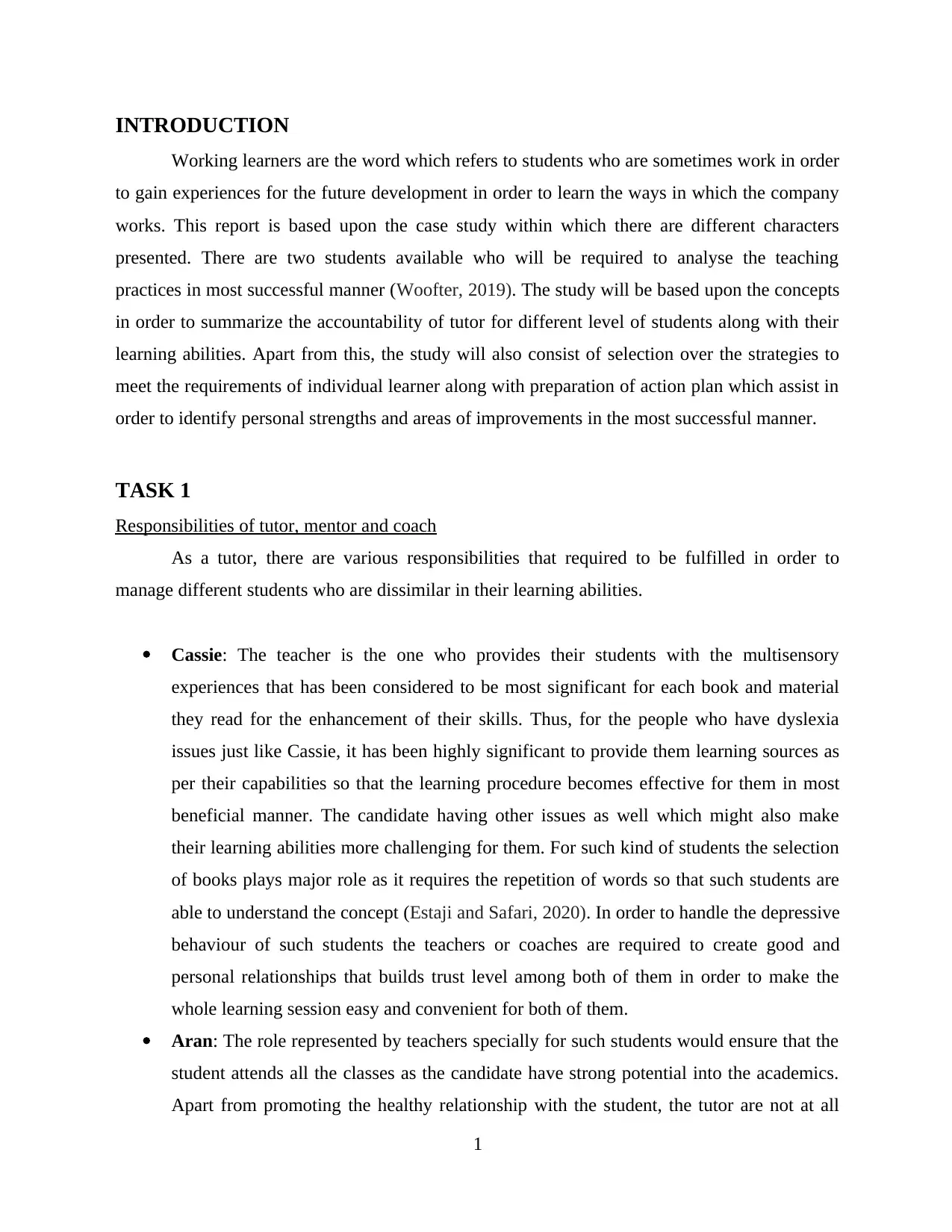
INTRODUCTION
Working learners are the word which refers to students who are sometimes work in order
to gain experiences for the future development in order to learn the ways in which the company
works. This report is based upon the case study within which there are different characters
presented. There are two students available who will be required to analyse the teaching
practices in most successful manner (Woofter, 2019). The study will be based upon the concepts
in order to summarize the accountability of tutor for different level of students along with their
learning abilities. Apart from this, the study will also consist of selection over the strategies to
meet the requirements of individual learner along with preparation of action plan which assist in
order to identify personal strengths and areas of improvements in the most successful manner.
TASK 1
Responsibilities of tutor, mentor and coach
As a tutor, there are various responsibilities that required to be fulfilled in order to
manage different students who are dissimilar in their learning abilities.
Cassie: The teacher is the one who provides their students with the multisensory
experiences that has been considered to be most significant for each book and material
they read for the enhancement of their skills. Thus, for the people who have dyslexia
issues just like Cassie, it has been highly significant to provide them learning sources as
per their capabilities so that the learning procedure becomes effective for them in most
beneficial manner. The candidate having other issues as well which might also make
their learning abilities more challenging for them. For such kind of students the selection
of books plays major role as it requires the repetition of words so that such students are
able to understand the concept (Estaji and Safari, 2020). In order to handle the depressive
behaviour of such students the teachers or coaches are required to create good and
personal relationships that builds trust level among both of them in order to make the
whole learning session easy and convenient for both of them.
Aran: The role represented by teachers specially for such students would ensure that the
student attends all the classes as the candidate have strong potential into the academics.
Apart from promoting the healthy relationship with the student, the tutor are not at all
1
Working learners are the word which refers to students who are sometimes work in order
to gain experiences for the future development in order to learn the ways in which the company
works. This report is based upon the case study within which there are different characters
presented. There are two students available who will be required to analyse the teaching
practices in most successful manner (Woofter, 2019). The study will be based upon the concepts
in order to summarize the accountability of tutor for different level of students along with their
learning abilities. Apart from this, the study will also consist of selection over the strategies to
meet the requirements of individual learner along with preparation of action plan which assist in
order to identify personal strengths and areas of improvements in the most successful manner.
TASK 1
Responsibilities of tutor, mentor and coach
As a tutor, there are various responsibilities that required to be fulfilled in order to
manage different students who are dissimilar in their learning abilities.
Cassie: The teacher is the one who provides their students with the multisensory
experiences that has been considered to be most significant for each book and material
they read for the enhancement of their skills. Thus, for the people who have dyslexia
issues just like Cassie, it has been highly significant to provide them learning sources as
per their capabilities so that the learning procedure becomes effective for them in most
beneficial manner. The candidate having other issues as well which might also make
their learning abilities more challenging for them. For such kind of students the selection
of books plays major role as it requires the repetition of words so that such students are
able to understand the concept (Estaji and Safari, 2020). In order to handle the depressive
behaviour of such students the teachers or coaches are required to create good and
personal relationships that builds trust level among both of them in order to make the
whole learning session easy and convenient for both of them.
Aran: The role represented by teachers specially for such students would ensure that the
student attends all the classes as the candidate have strong potential into the academics.
Apart from promoting the healthy relationship with the student, the tutor are not at all
1
⊘ This is a preview!⊘
Do you want full access?
Subscribe today to unlock all pages.

Trusted by 1+ million students worldwide
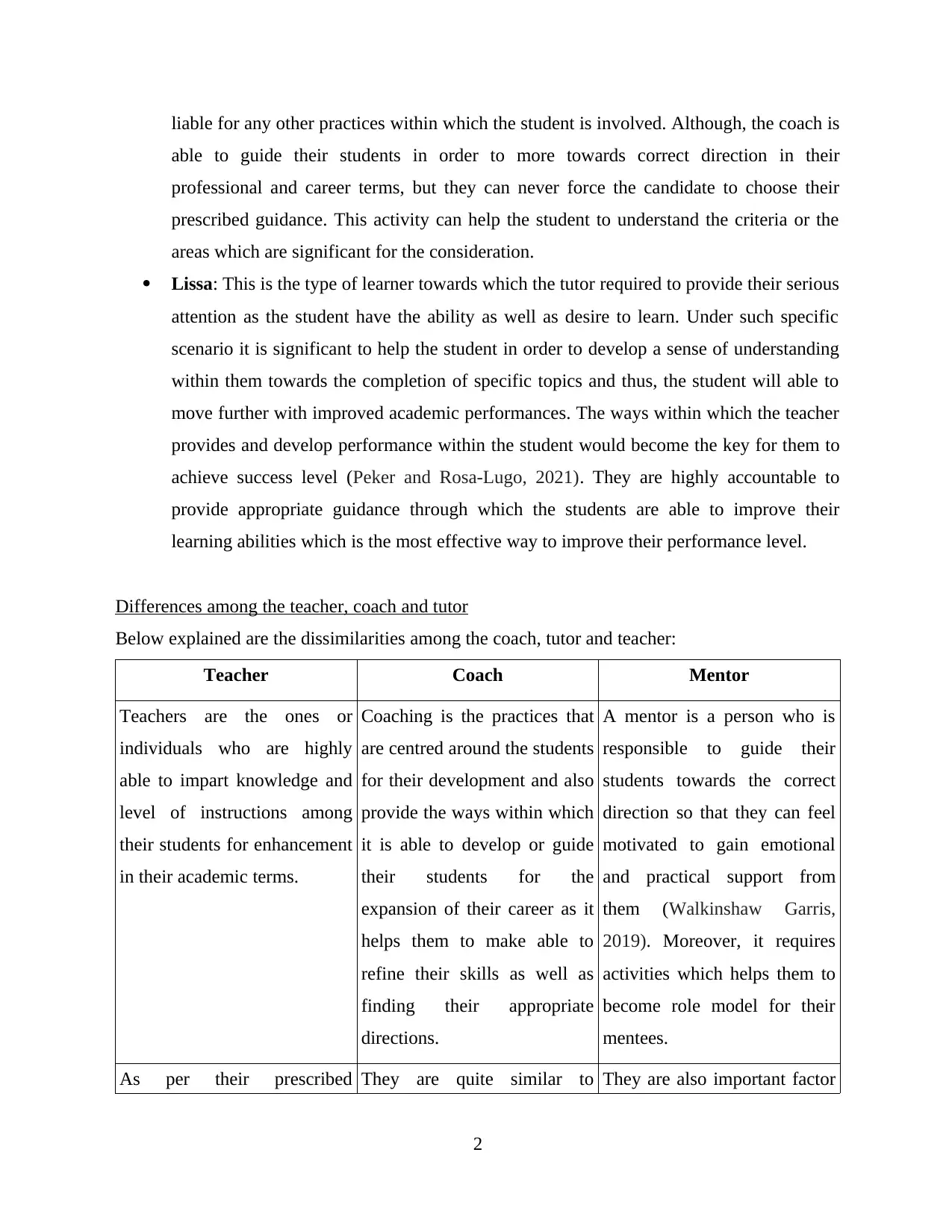
liable for any other practices within which the student is involved. Although, the coach is
able to guide their students in order to more towards correct direction in their
professional and career terms, but they can never force the candidate to choose their
prescribed guidance. This activity can help the student to understand the criteria or the
areas which are significant for the consideration.
Lissa: This is the type of learner towards which the tutor required to provide their serious
attention as the student have the ability as well as desire to learn. Under such specific
scenario it is significant to help the student in order to develop a sense of understanding
within them towards the completion of specific topics and thus, the student will able to
move further with improved academic performances. The ways within which the teacher
provides and develop performance within the student would become the key for them to
achieve success level (Peker and Rosa-Lugo, 2021). They are highly accountable to
provide appropriate guidance through which the students are able to improve their
learning abilities which is the most effective way to improve their performance level.
Differences among the teacher, coach and tutor
Below explained are the dissimilarities among the coach, tutor and teacher:
Teacher Coach Mentor
Teachers are the ones or
individuals who are highly
able to impart knowledge and
level of instructions among
their students for enhancement
in their academic terms.
Coaching is the practices that
are centred around the students
for their development and also
provide the ways within which
it is able to develop or guide
their students for the
expansion of their career as it
helps them to make able to
refine their skills as well as
finding their appropriate
directions.
A mentor is a person who is
responsible to guide their
students towards the correct
direction so that they can feel
motivated to gain emotional
and practical support from
them (Walkinshaw Garris,
2019). Moreover, it requires
activities which helps them to
become role model for their
mentees.
As per their prescribed They are quite similar to They are also important factor
2
able to guide their students in order to more towards correct direction in their
professional and career terms, but they can never force the candidate to choose their
prescribed guidance. This activity can help the student to understand the criteria or the
areas which are significant for the consideration.
Lissa: This is the type of learner towards which the tutor required to provide their serious
attention as the student have the ability as well as desire to learn. Under such specific
scenario it is significant to help the student in order to develop a sense of understanding
within them towards the completion of specific topics and thus, the student will able to
move further with improved academic performances. The ways within which the teacher
provides and develop performance within the student would become the key for them to
achieve success level (Peker and Rosa-Lugo, 2021). They are highly accountable to
provide appropriate guidance through which the students are able to improve their
learning abilities which is the most effective way to improve their performance level.
Differences among the teacher, coach and tutor
Below explained are the dissimilarities among the coach, tutor and teacher:
Teacher Coach Mentor
Teachers are the ones or
individuals who are highly
able to impart knowledge and
level of instructions among
their students for enhancement
in their academic terms.
Coaching is the practices that
are centred around the students
for their development and also
provide the ways within which
it is able to develop or guide
their students for the
expansion of their career as it
helps them to make able to
refine their skills as well as
finding their appropriate
directions.
A mentor is a person who is
responsible to guide their
students towards the correct
direction so that they can feel
motivated to gain emotional
and practical support from
them (Walkinshaw Garris,
2019). Moreover, it requires
activities which helps them to
become role model for their
mentees.
As per their prescribed They are quite similar to They are also important factor
2
Paraphrase This Document
Need a fresh take? Get an instant paraphrase of this document with our AI Paraphraser
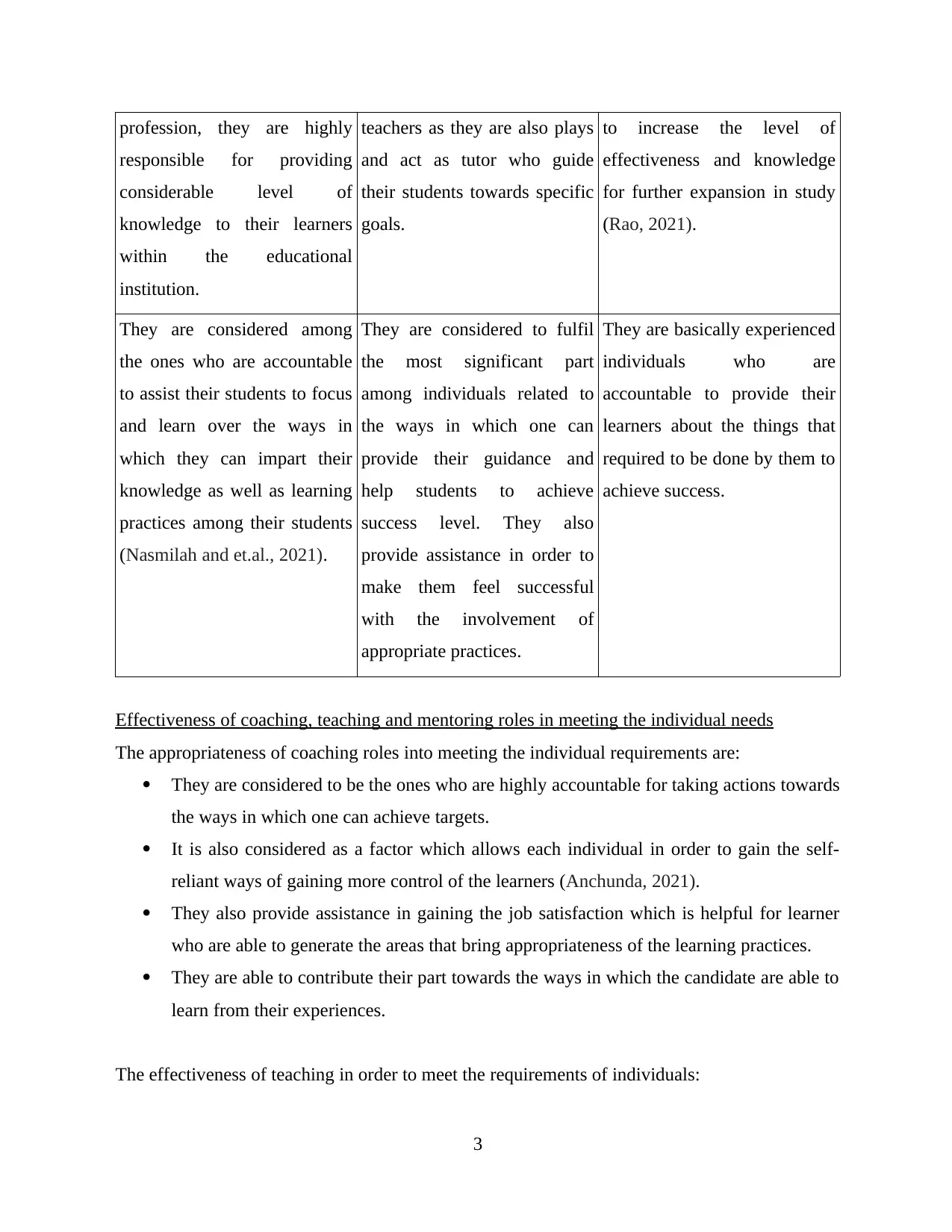
profession, they are highly
responsible for providing
considerable level of
knowledge to their learners
within the educational
institution.
teachers as they are also plays
and act as tutor who guide
their students towards specific
goals.
to increase the level of
effectiveness and knowledge
for further expansion in study
(Rao, 2021).
They are considered among
the ones who are accountable
to assist their students to focus
and learn over the ways in
which they can impart their
knowledge as well as learning
practices among their students
(Nasmilah and et.al., 2021).
They are considered to fulfil
the most significant part
among individuals related to
the ways in which one can
provide their guidance and
help students to achieve
success level. They also
provide assistance in order to
make them feel successful
with the involvement of
appropriate practices.
They are basically experienced
individuals who are
accountable to provide their
learners about the things that
required to be done by them to
achieve success.
Effectiveness of coaching, teaching and mentoring roles in meeting the individual needs
The appropriateness of coaching roles into meeting the individual requirements are:
They are considered to be the ones who are highly accountable for taking actions towards
the ways in which one can achieve targets.
It is also considered as a factor which allows each individual in order to gain the self-
reliant ways of gaining more control of the learners (Anchunda, 2021).
They also provide assistance in gaining the job satisfaction which is helpful for learner
who are able to generate the areas that bring appropriateness of the learning practices.
They are able to contribute their part towards the ways in which the candidate are able to
learn from their experiences.
The effectiveness of teaching in order to meet the requirements of individuals:
3
responsible for providing
considerable level of
knowledge to their learners
within the educational
institution.
teachers as they are also plays
and act as tutor who guide
their students towards specific
goals.
to increase the level of
effectiveness and knowledge
for further expansion in study
(Rao, 2021).
They are considered among
the ones who are accountable
to assist their students to focus
and learn over the ways in
which they can impart their
knowledge as well as learning
practices among their students
(Nasmilah and et.al., 2021).
They are considered to fulfil
the most significant part
among individuals related to
the ways in which one can
provide their guidance and
help students to achieve
success level. They also
provide assistance in order to
make them feel successful
with the involvement of
appropriate practices.
They are basically experienced
individuals who are
accountable to provide their
learners about the things that
required to be done by them to
achieve success.
Effectiveness of coaching, teaching and mentoring roles in meeting the individual needs
The appropriateness of coaching roles into meeting the individual requirements are:
They are considered to be the ones who are highly accountable for taking actions towards
the ways in which one can achieve targets.
It is also considered as a factor which allows each individual in order to gain the self-
reliant ways of gaining more control of the learners (Anchunda, 2021).
They also provide assistance in gaining the job satisfaction which is helpful for learner
who are able to generate the areas that bring appropriateness of the learning practices.
They are able to contribute their part towards the ways in which the candidate are able to
learn from their experiences.
The effectiveness of teaching in order to meet the requirements of individuals:
3
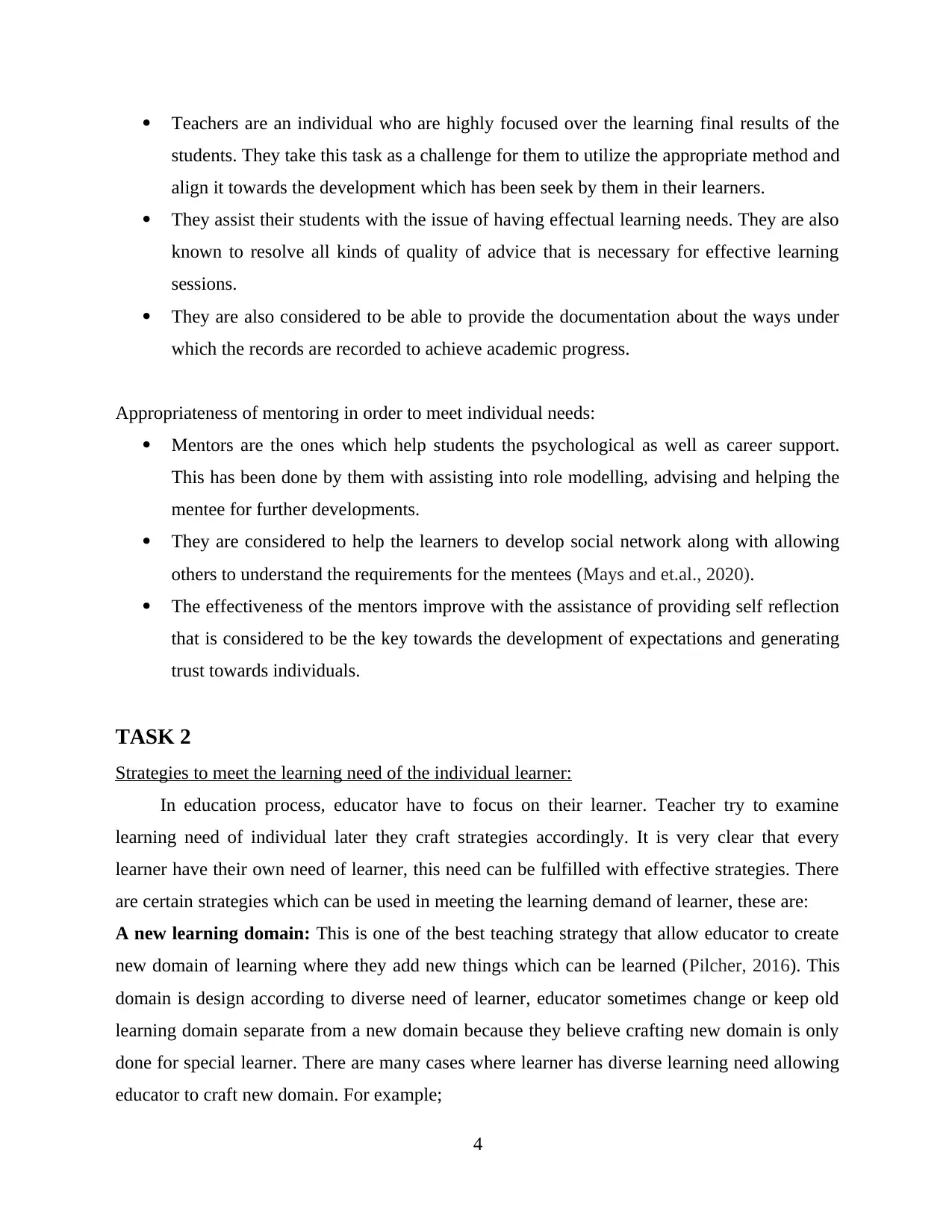
Teachers are an individual who are highly focused over the learning final results of the
students. They take this task as a challenge for them to utilize the appropriate method and
align it towards the development which has been seek by them in their learners.
They assist their students with the issue of having effectual learning needs. They are also
known to resolve all kinds of quality of advice that is necessary for effective learning
sessions.
They are also considered to be able to provide the documentation about the ways under
which the records are recorded to achieve academic progress.
Appropriateness of mentoring in order to meet individual needs:
Mentors are the ones which help students the psychological as well as career support.
This has been done by them with assisting into role modelling, advising and helping the
mentee for further developments.
They are considered to help the learners to develop social network along with allowing
others to understand the requirements for the mentees (Mays and et.al., 2020).
The effectiveness of the mentors improve with the assistance of providing self reflection
that is considered to be the key towards the development of expectations and generating
trust towards individuals.
TASK 2
Strategies to meet the learning need of the individual learner:
In education process, educator have to focus on their learner. Teacher try to examine
learning need of individual later they craft strategies accordingly. It is very clear that every
learner have their own need of learner, this need can be fulfilled with effective strategies. There
are certain strategies which can be used in meeting the learning demand of learner, these are:
A new learning domain: This is one of the best teaching strategy that allow educator to create
new domain of learning where they add new things which can be learned (Pilcher, 2016). This
domain is design according to diverse need of learner, educator sometimes change or keep old
learning domain separate from a new domain because they believe crafting new domain is only
done for special learner. There are many cases where learner has diverse learning need allowing
educator to craft new domain. For example;
4
students. They take this task as a challenge for them to utilize the appropriate method and
align it towards the development which has been seek by them in their learners.
They assist their students with the issue of having effectual learning needs. They are also
known to resolve all kinds of quality of advice that is necessary for effective learning
sessions.
They are also considered to be able to provide the documentation about the ways under
which the records are recorded to achieve academic progress.
Appropriateness of mentoring in order to meet individual needs:
Mentors are the ones which help students the psychological as well as career support.
This has been done by them with assisting into role modelling, advising and helping the
mentee for further developments.
They are considered to help the learners to develop social network along with allowing
others to understand the requirements for the mentees (Mays and et.al., 2020).
The effectiveness of the mentors improve with the assistance of providing self reflection
that is considered to be the key towards the development of expectations and generating
trust towards individuals.
TASK 2
Strategies to meet the learning need of the individual learner:
In education process, educator have to focus on their learner. Teacher try to examine
learning need of individual later they craft strategies accordingly. It is very clear that every
learner have their own need of learner, this need can be fulfilled with effective strategies. There
are certain strategies which can be used in meeting the learning demand of learner, these are:
A new learning domain: This is one of the best teaching strategy that allow educator to create
new domain of learning where they add new things which can be learned (Pilcher, 2016). This
domain is design according to diverse need of learner, educator sometimes change or keep old
learning domain separate from a new domain because they believe crafting new domain is only
done for special learner. There are many cases where learner has diverse learning need allowing
educator to craft new domain. For example;
4
⊘ This is a preview!⊘
Do you want full access?
Subscribe today to unlock all pages.

Trusted by 1+ million students worldwide
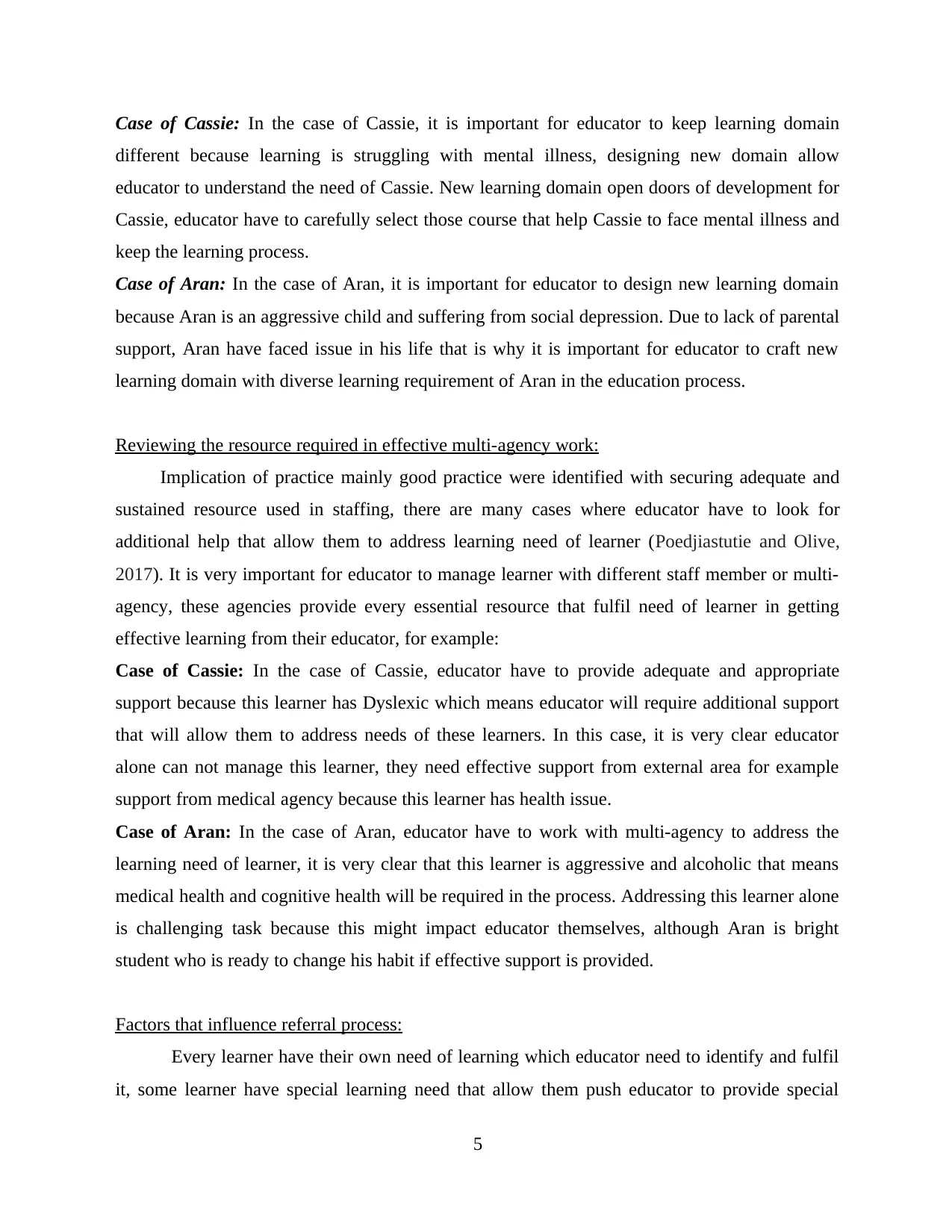
Case of Cassie: In the case of Cassie, it is important for educator to keep learning domain
different because learning is struggling with mental illness, designing new domain allow
educator to understand the need of Cassie. New learning domain open doors of development for
Cassie, educator have to carefully select those course that help Cassie to face mental illness and
keep the learning process.
Case of Aran: In the case of Aran, it is important for educator to design new learning domain
because Aran is an aggressive child and suffering from social depression. Due to lack of parental
support, Aran have faced issue in his life that is why it is important for educator to craft new
learning domain with diverse learning requirement of Aran in the education process.
Reviewing the resource required in effective multi-agency work:
Implication of practice mainly good practice were identified with securing adequate and
sustained resource used in staffing, there are many cases where educator have to look for
additional help that allow them to address learning need of learner (Poedjiastutie and Olive,
2017). It is very important for educator to manage learner with different staff member or multi-
agency, these agencies provide every essential resource that fulfil need of learner in getting
effective learning from their educator, for example:
Case of Cassie: In the case of Cassie, educator have to provide adequate and appropriate
support because this learner has Dyslexic which means educator will require additional support
that will allow them to address needs of these learners. In this case, it is very clear educator
alone can not manage this learner, they need effective support from external area for example
support from medical agency because this learner has health issue.
Case of Aran: In the case of Aran, educator have to work with multi-agency to address the
learning need of learner, it is very clear that this learner is aggressive and alcoholic that means
medical health and cognitive health will be required in the process. Addressing this learner alone
is challenging task because this might impact educator themselves, although Aran is bright
student who is ready to change his habit if effective support is provided.
Factors that influence referral process:
Every learner have their own need of learning which educator need to identify and fulfil
it, some learner have special learning need that allow them push educator to provide special
5
different because learning is struggling with mental illness, designing new domain allow
educator to understand the need of Cassie. New learning domain open doors of development for
Cassie, educator have to carefully select those course that help Cassie to face mental illness and
keep the learning process.
Case of Aran: In the case of Aran, it is important for educator to design new learning domain
because Aran is an aggressive child and suffering from social depression. Due to lack of parental
support, Aran have faced issue in his life that is why it is important for educator to craft new
learning domain with diverse learning requirement of Aran in the education process.
Reviewing the resource required in effective multi-agency work:
Implication of practice mainly good practice were identified with securing adequate and
sustained resource used in staffing, there are many cases where educator have to look for
additional help that allow them to address learning need of learner (Poedjiastutie and Olive,
2017). It is very important for educator to manage learner with different staff member or multi-
agency, these agencies provide every essential resource that fulfil need of learner in getting
effective learning from their educator, for example:
Case of Cassie: In the case of Cassie, educator have to provide adequate and appropriate
support because this learner has Dyslexic which means educator will require additional support
that will allow them to address needs of these learners. In this case, it is very clear educator
alone can not manage this learner, they need effective support from external area for example
support from medical agency because this learner has health issue.
Case of Aran: In the case of Aran, educator have to work with multi-agency to address the
learning need of learner, it is very clear that this learner is aggressive and alcoholic that means
medical health and cognitive health will be required in the process. Addressing this learner alone
is challenging task because this might impact educator themselves, although Aran is bright
student who is ready to change his habit if effective support is provided.
Factors that influence referral process:
Every learner have their own need of learning which educator need to identify and fulfil
it, some learner have special learning need that allow them push educator to provide special
5
Paraphrase This Document
Need a fresh take? Get an instant paraphrase of this document with our AI Paraphraser
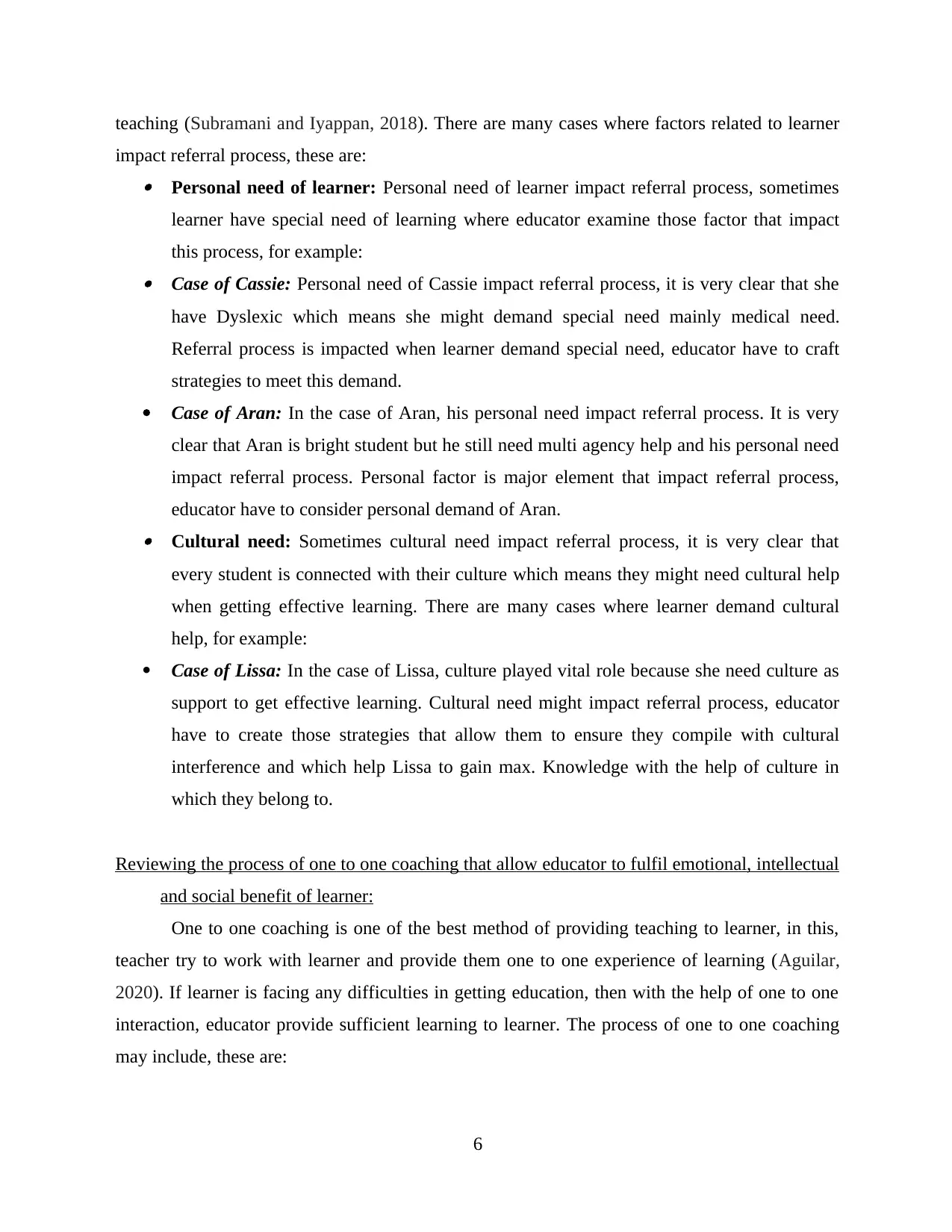
teaching (Subramani and Iyappan, 2018). There are many cases where factors related to learner
impact referral process, these are: Personal need of learner: Personal need of learner impact referral process, sometimes
learner have special need of learning where educator examine those factor that impact
this process, for example: Case of Cassie: Personal need of Cassie impact referral process, it is very clear that she
have Dyslexic which means she might demand special need mainly medical need.
Referral process is impacted when learner demand special need, educator have to craft
strategies to meet this demand.
Case of Aran: In the case of Aran, his personal need impact referral process. It is very
clear that Aran is bright student but he still need multi agency help and his personal need
impact referral process. Personal factor is major element that impact referral process,
educator have to consider personal demand of Aran. Cultural need: Sometimes cultural need impact referral process, it is very clear that
every student is connected with their culture which means they might need cultural help
when getting effective learning. There are many cases where learner demand cultural
help, for example:
Case of Lissa: In the case of Lissa, culture played vital role because she need culture as
support to get effective learning. Cultural need might impact referral process, educator
have to create those strategies that allow them to ensure they compile with cultural
interference and which help Lissa to gain max. Knowledge with the help of culture in
which they belong to.
Reviewing the process of one to one coaching that allow educator to fulfil emotional, intellectual
and social benefit of learner:
One to one coaching is one of the best method of providing teaching to learner, in this,
teacher try to work with learner and provide them one to one experience of learning (Aguilar,
2020). If learner is facing any difficulties in getting education, then with the help of one to one
interaction, educator provide sufficient learning to learner. The process of one to one coaching
may include, these are:
6
impact referral process, these are: Personal need of learner: Personal need of learner impact referral process, sometimes
learner have special need of learning where educator examine those factor that impact
this process, for example: Case of Cassie: Personal need of Cassie impact referral process, it is very clear that she
have Dyslexic which means she might demand special need mainly medical need.
Referral process is impacted when learner demand special need, educator have to craft
strategies to meet this demand.
Case of Aran: In the case of Aran, his personal need impact referral process. It is very
clear that Aran is bright student but he still need multi agency help and his personal need
impact referral process. Personal factor is major element that impact referral process,
educator have to consider personal demand of Aran. Cultural need: Sometimes cultural need impact referral process, it is very clear that
every student is connected with their culture which means they might need cultural help
when getting effective learning. There are many cases where learner demand cultural
help, for example:
Case of Lissa: In the case of Lissa, culture played vital role because she need culture as
support to get effective learning. Cultural need might impact referral process, educator
have to create those strategies that allow them to ensure they compile with cultural
interference and which help Lissa to gain max. Knowledge with the help of culture in
which they belong to.
Reviewing the process of one to one coaching that allow educator to fulfil emotional, intellectual
and social benefit of learner:
One to one coaching is one of the best method of providing teaching to learner, in this,
teacher try to work with learner and provide them one to one experience of learning (Aguilar,
2020). If learner is facing any difficulties in getting education, then with the help of one to one
interaction, educator provide sufficient learning to learner. The process of one to one coaching
may include, these are:
6
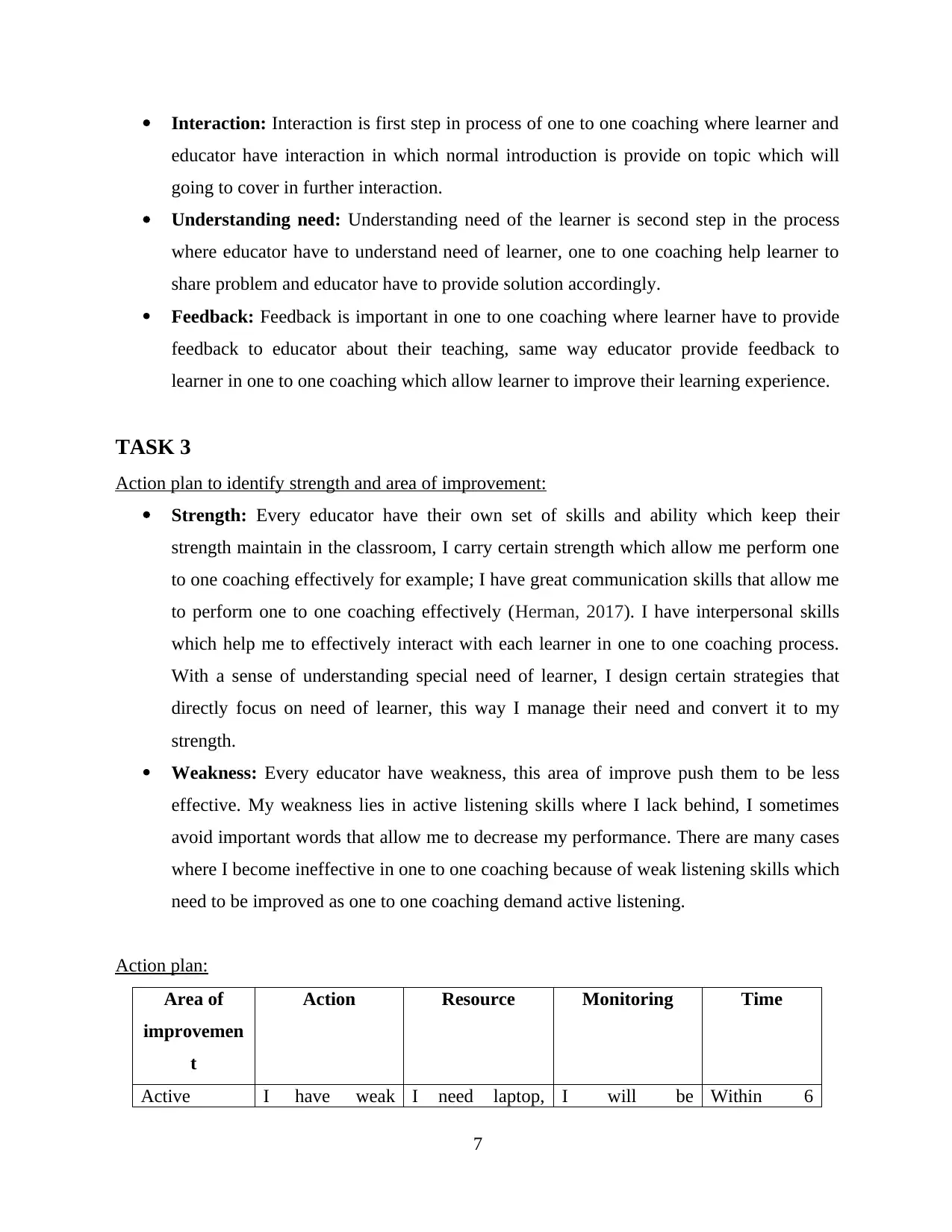
Interaction: Interaction is first step in process of one to one coaching where learner and
educator have interaction in which normal introduction is provide on topic which will
going to cover in further interaction.
Understanding need: Understanding need of the learner is second step in the process
where educator have to understand need of learner, one to one coaching help learner to
share problem and educator have to provide solution accordingly.
Feedback: Feedback is important in one to one coaching where learner have to provide
feedback to educator about their teaching, same way educator provide feedback to
learner in one to one coaching which allow learner to improve their learning experience.
TASK 3
Action plan to identify strength and area of improvement:
Strength: Every educator have their own set of skills and ability which keep their
strength maintain in the classroom, I carry certain strength which allow me perform one
to one coaching effectively for example; I have great communication skills that allow me
to perform one to one coaching effectively (Herman, 2017). I have interpersonal skills
which help me to effectively interact with each learner in one to one coaching process.
With a sense of understanding special need of learner, I design certain strategies that
directly focus on need of learner, this way I manage their need and convert it to my
strength.
Weakness: Every educator have weakness, this area of improve push them to be less
effective. My weakness lies in active listening skills where I lack behind, I sometimes
avoid important words that allow me to decrease my performance. There are many cases
where I become ineffective in one to one coaching because of weak listening skills which
need to be improved as one to one coaching demand active listening.
Action plan:
Area of
improvemen
t
Action Resource Monitoring Time
Active I have weak I need laptop, I will be Within 6
7
educator have interaction in which normal introduction is provide on topic which will
going to cover in further interaction.
Understanding need: Understanding need of the learner is second step in the process
where educator have to understand need of learner, one to one coaching help learner to
share problem and educator have to provide solution accordingly.
Feedback: Feedback is important in one to one coaching where learner have to provide
feedback to educator about their teaching, same way educator provide feedback to
learner in one to one coaching which allow learner to improve their learning experience.
TASK 3
Action plan to identify strength and area of improvement:
Strength: Every educator have their own set of skills and ability which keep their
strength maintain in the classroom, I carry certain strength which allow me perform one
to one coaching effectively for example; I have great communication skills that allow me
to perform one to one coaching effectively (Herman, 2017). I have interpersonal skills
which help me to effectively interact with each learner in one to one coaching process.
With a sense of understanding special need of learner, I design certain strategies that
directly focus on need of learner, this way I manage their need and convert it to my
strength.
Weakness: Every educator have weakness, this area of improve push them to be less
effective. My weakness lies in active listening skills where I lack behind, I sometimes
avoid important words that allow me to decrease my performance. There are many cases
where I become ineffective in one to one coaching because of weak listening skills which
need to be improved as one to one coaching demand active listening.
Action plan:
Area of
improvemen
t
Action Resource Monitoring Time
Active I have weak I need laptop, I will be Within 6
7
⊘ This is a preview!⊘
Do you want full access?
Subscribe today to unlock all pages.

Trusted by 1+ million students worldwide
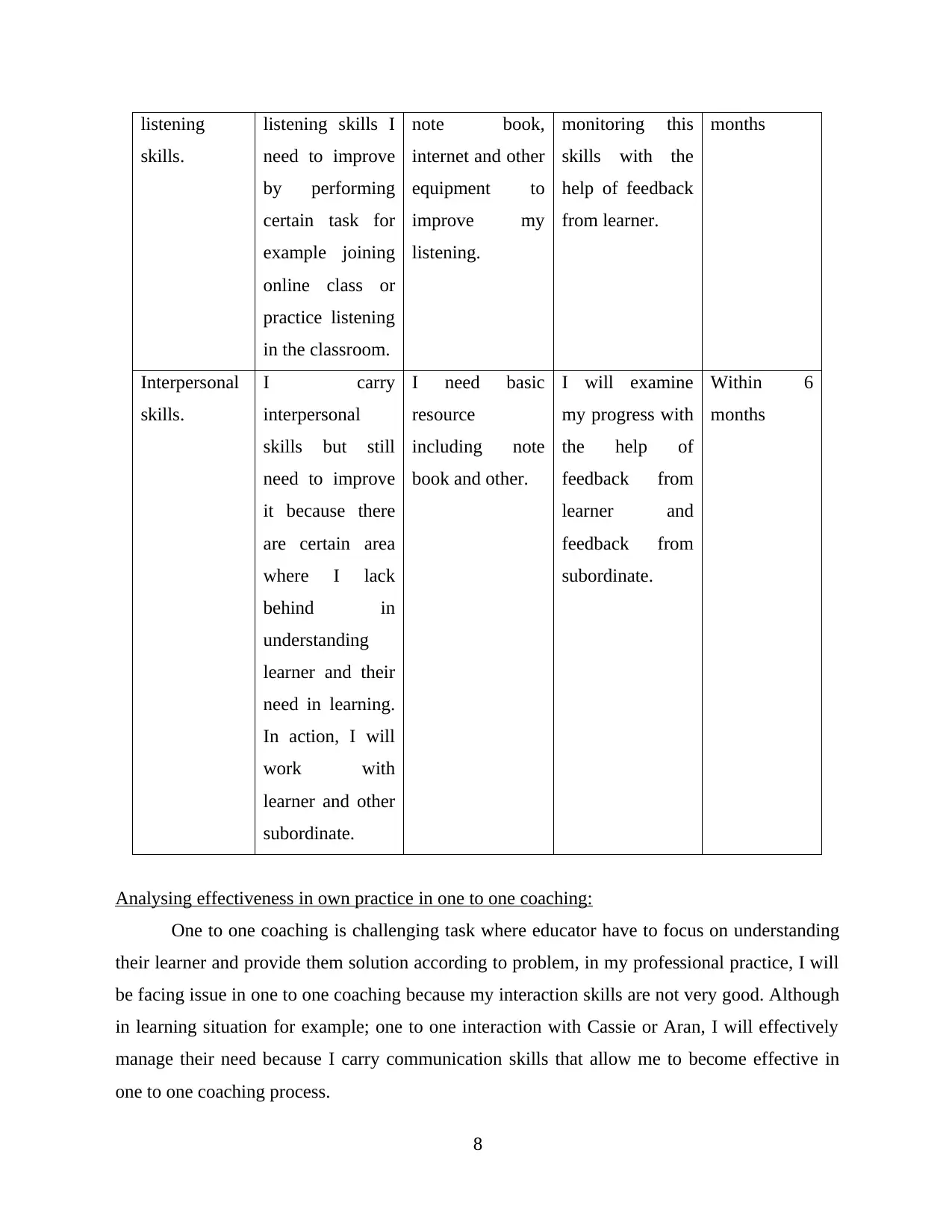
listening
skills.
listening skills I
need to improve
by performing
certain task for
example joining
online class or
practice listening
in the classroom.
note book,
internet and other
equipment to
improve my
listening.
monitoring this
skills with the
help of feedback
from learner.
months
Interpersonal
skills.
I carry
interpersonal
skills but still
need to improve
it because there
are certain area
where I lack
behind in
understanding
learner and their
need in learning.
In action, I will
work with
learner and other
subordinate.
I need basic
resource
including note
book and other.
I will examine
my progress with
the help of
feedback from
learner and
feedback from
subordinate.
Within 6
months
Analysing effectiveness in own practice in one to one coaching:
One to one coaching is challenging task where educator have to focus on understanding
their learner and provide them solution according to problem, in my professional practice, I will
be facing issue in one to one coaching because my interaction skills are not very good. Although
in learning situation for example; one to one interaction with Cassie or Aran, I will effectively
manage their need because I carry communication skills that allow me to become effective in
one to one coaching process.
8
skills.
listening skills I
need to improve
by performing
certain task for
example joining
online class or
practice listening
in the classroom.
note book,
internet and other
equipment to
improve my
listening.
monitoring this
skills with the
help of feedback
from learner.
months
Interpersonal
skills.
I carry
interpersonal
skills but still
need to improve
it because there
are certain area
where I lack
behind in
understanding
learner and their
need in learning.
In action, I will
work with
learner and other
subordinate.
I need basic
resource
including note
book and other.
I will examine
my progress with
the help of
feedback from
learner and
feedback from
subordinate.
Within 6
months
Analysing effectiveness in own practice in one to one coaching:
One to one coaching is challenging task where educator have to focus on understanding
their learner and provide them solution according to problem, in my professional practice, I will
be facing issue in one to one coaching because my interaction skills are not very good. Although
in learning situation for example; one to one interaction with Cassie or Aran, I will effectively
manage their need because I carry communication skills that allow me to become effective in
one to one coaching process.
8
Paraphrase This Document
Need a fresh take? Get an instant paraphrase of this document with our AI Paraphraser
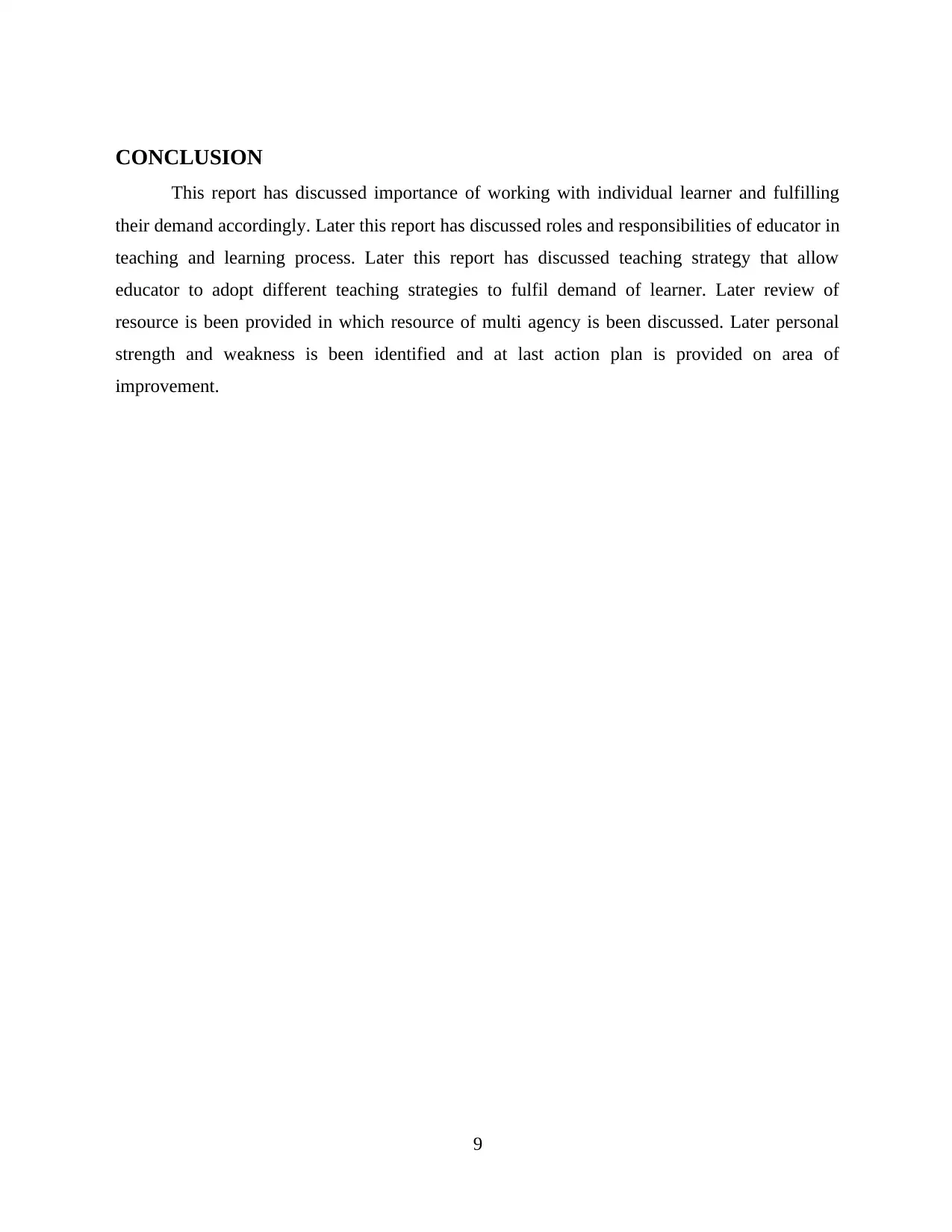
CONCLUSION
This report has discussed importance of working with individual learner and fulfilling
their demand accordingly. Later this report has discussed roles and responsibilities of educator in
teaching and learning process. Later this report has discussed teaching strategy that allow
educator to adopt different teaching strategies to fulfil demand of learner. Later review of
resource is been provided in which resource of multi agency is been discussed. Later personal
strength and weakness is been identified and at last action plan is provided on area of
improvement.
9
This report has discussed importance of working with individual learner and fulfilling
their demand accordingly. Later this report has discussed roles and responsibilities of educator in
teaching and learning process. Later this report has discussed teaching strategy that allow
educator to adopt different teaching strategies to fulfil demand of learner. Later review of
resource is been provided in which resource of multi agency is been discussed. Later personal
strength and weakness is been identified and at last action plan is provided on area of
improvement.
9
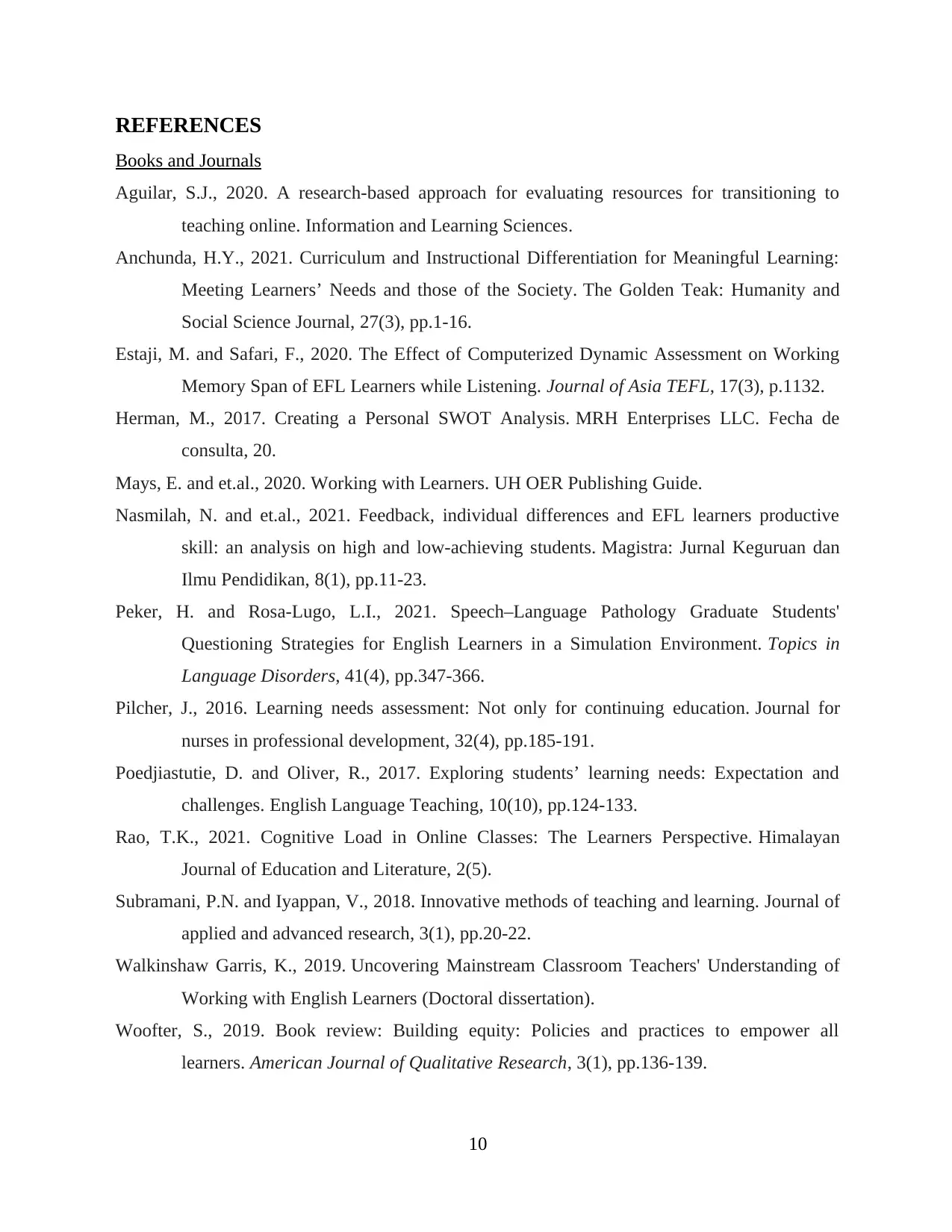
REFERENCES
Books and Journals
Aguilar, S.J., 2020. A research-based approach for evaluating resources for transitioning to
teaching online. Information and Learning Sciences.
Anchunda, H.Y., 2021. Curriculum and Instructional Differentiation for Meaningful Learning:
Meeting Learners’ Needs and those of the Society. The Golden Teak: Humanity and
Social Science Journal, 27(3), pp.1-16.
Estaji, M. and Safari, F., 2020. The Effect of Computerized Dynamic Assessment on Working
Memory Span of EFL Learners while Listening. Journal of Asia TEFL, 17(3), p.1132.
Herman, M., 2017. Creating a Personal SWOT Analysis. MRH Enterprises LLC. Fecha de
consulta, 20.
Mays, E. and et.al., 2020. Working with Learners. UH OER Publishing Guide.
Nasmilah, N. and et.al., 2021. Feedback, individual differences and EFL learners productive
skill: an analysis on high and low-achieving students. Magistra: Jurnal Keguruan dan
Ilmu Pendidikan, 8(1), pp.11-23.
Peker, H. and Rosa-Lugo, L.I., 2021. Speech–Language Pathology Graduate Students'
Questioning Strategies for English Learners in a Simulation Environment. Topics in
Language Disorders, 41(4), pp.347-366.
Pilcher, J., 2016. Learning needs assessment: Not only for continuing education. Journal for
nurses in professional development, 32(4), pp.185-191.
Poedjiastutie, D. and Oliver, R., 2017. Exploring students’ learning needs: Expectation and
challenges. English Language Teaching, 10(10), pp.124-133.
Rao, T.K., 2021. Cognitive Load in Online Classes: The Learners Perspective. Himalayan
Journal of Education and Literature, 2(5).
Subramani, P.N. and Iyappan, V., 2018. Innovative methods of teaching and learning. Journal of
applied and advanced research, 3(1), pp.20-22.
Walkinshaw Garris, K., 2019. Uncovering Mainstream Classroom Teachers' Understanding of
Working with English Learners (Doctoral dissertation).
Woofter, S., 2019. Book review: Building equity: Policies and practices to empower all
learners. American Journal of Qualitative Research, 3(1), pp.136-139.
10
Books and Journals
Aguilar, S.J., 2020. A research-based approach for evaluating resources for transitioning to
teaching online. Information and Learning Sciences.
Anchunda, H.Y., 2021. Curriculum and Instructional Differentiation for Meaningful Learning:
Meeting Learners’ Needs and those of the Society. The Golden Teak: Humanity and
Social Science Journal, 27(3), pp.1-16.
Estaji, M. and Safari, F., 2020. The Effect of Computerized Dynamic Assessment on Working
Memory Span of EFL Learners while Listening. Journal of Asia TEFL, 17(3), p.1132.
Herman, M., 2017. Creating a Personal SWOT Analysis. MRH Enterprises LLC. Fecha de
consulta, 20.
Mays, E. and et.al., 2020. Working with Learners. UH OER Publishing Guide.
Nasmilah, N. and et.al., 2021. Feedback, individual differences and EFL learners productive
skill: an analysis on high and low-achieving students. Magistra: Jurnal Keguruan dan
Ilmu Pendidikan, 8(1), pp.11-23.
Peker, H. and Rosa-Lugo, L.I., 2021. Speech–Language Pathology Graduate Students'
Questioning Strategies for English Learners in a Simulation Environment. Topics in
Language Disorders, 41(4), pp.347-366.
Pilcher, J., 2016. Learning needs assessment: Not only for continuing education. Journal for
nurses in professional development, 32(4), pp.185-191.
Poedjiastutie, D. and Oliver, R., 2017. Exploring students’ learning needs: Expectation and
challenges. English Language Teaching, 10(10), pp.124-133.
Rao, T.K., 2021. Cognitive Load in Online Classes: The Learners Perspective. Himalayan
Journal of Education and Literature, 2(5).
Subramani, P.N. and Iyappan, V., 2018. Innovative methods of teaching and learning. Journal of
applied and advanced research, 3(1), pp.20-22.
Walkinshaw Garris, K., 2019. Uncovering Mainstream Classroom Teachers' Understanding of
Working with English Learners (Doctoral dissertation).
Woofter, S., 2019. Book review: Building equity: Policies and practices to empower all
learners. American Journal of Qualitative Research, 3(1), pp.136-139.
10
⊘ This is a preview!⊘
Do you want full access?
Subscribe today to unlock all pages.

Trusted by 1+ million students worldwide
1 out of 12
Related Documents
Your All-in-One AI-Powered Toolkit for Academic Success.
+13062052269
info@desklib.com
Available 24*7 on WhatsApp / Email
![[object Object]](/_next/static/media/star-bottom.7253800d.svg)
Unlock your academic potential
Copyright © 2020–2026 A2Z Services. All Rights Reserved. Developed and managed by ZUCOL.




